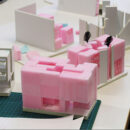Fakultät für Architektur

Fakultät für Architektur
Rechbauerstraße 12
8010 Graz
AT
N 47° 4' 9.54'', E 47° 4' 9.54''
https://www.tugraz.at/en/fakultaeten/architektur/home/
Dean
Master of Science
Doctoral School
Architecture forms an arch between art and technology. Architectural design consists of identifying, defining and reflecting on complex problems of living space and refers to the creation, change and preservation of a safe and aesthetically appealing environment worth living in. The study programmes at the TU Graz Faculty of Architecture have a generalist character and promote a holistic way of working and thinking through project-oriented teaching. The faculty has many teachers with international backgrounds who boast of a wealth of practical experience. Graduates from the Faculty of Architecture in Graz have gained a good reputation on a national and international level due to their ability to think in a critical and innovative way, and their professional competence which extends beyond the traditional fields of activity.
Graz University of Technology was founded in 1811. The various university buildings are embedded in the urban fabric of the city. Most institutes of the architecture faculty are based in the main building at Rechbauerstraße 12.
1296 students (726 Bachelor, 514 Master, 56 PhD), 5% of foreign students.
300 staff members (250 full-time and approx. 50 visiting lecturers and critics).
110
CAD Lab
CNC Milling
Furniture Shop
Laser Cutter
Library
Light Lab
Media Lab
Photographic Lab
Plot centre
Robot Lab
Structure Lab
The bachelor’s programme in architecture begins with a two-semester orientation phase followed by a four-semester foundation phase. Teaching content is arranged in the following four thematic groups:
– History of architecture, architectural theory, art and cultural studies;
– Architectural drafting (core competence);
– Design, technology, materials;
– Architectural representations and artistic practices.
The bachelor’s programme ends with the academic degree of “Bachelor of Science” (BSc). The BSc forms the basis of architectural knowledge, however the master’s programme provides the in-depth knowledge necessary to go into the architectural profession.
Master of Science, Master's Programme, 4 terms, Master, 121,
The four-semester master’s programme with a total of 120 ECTS credits goes much more in depth with the knowledge gained in the Bachelor’s programme. In addition to the focus on drafting, a variety of topics have been planned in the master’s programme in Architecture and these are accompanied by specialised optional subjects. Each topic is completed by the end of each semester to enable students to plan for studying at other universities at home or abroad.
The four-semester course of study is completed with a master’s thesis in the fourth semester. Graduates are awarded the academic degree of “Diplom-Ingenieurin” or “Diplom-Ingenieur”, which is internationally equivalent to a “Master of Science” (MSc.) This degree entitles the student to embark on an engineering doctoral programme.
Doctoral School, Doctoral School, 6 terms, Dr.techn.,
The Doctoral School imparts the methods and knowledge required to carry out independent architectural research at a high scientific level. Through research-based study, students gain in-depth knowledge in various architectural fields. The Doctoral School offers doctoral students the opportunity to carry out individually-supervised scientific work in both basic and applied research on current architectural issues.
The writing of a dissertation constitutes the core of the doctoral program. The choice of dissertation topic is closely linked to the choice of the supervisor. This supervisor supports the doctoral student with writing the dissertation and with recommendations for relevant research colloqia, conferences or conventions, where results of the ongoing research can be presented to a broader public audience. Both in the preliminary stages of research and during the writing of the dissertation, doctoral students attend 14 hours of courses per week, selected from a catalog of compulsory subjects. The Doctoral School´s language of instruction is English. The period of study for the doctoral degree is most often six semesters (3 years) and concludes with the conferring of the academic title of Doctor of Technology (Dr.techn.).
Please find detailed information on the Curriculum here
Bachelor’s Programme
Architects play an essential role in shaping and designing our environment. The architectural field has technical, economic, legal, political and cultural aspects. The degree programme introduces students to fundamental issues of the profession and its complex interrelationships. Tasks range from the large-scale view of landscape, region and the city to individual types of buildings, culminating in design and space at the detailed level. As well as learning the methodological basis, students should be prepared to acquire a broad range of cultural knowledge, an understanding of cultural interrelations, and social skills.
Structure of the Programme
The study programme for architecture is divided into a six-semester bachelor’s programme and a postgraduate, four-semester master’s programme. The bachelor’s programme in architecture begins with a two-semester orientation phase followed by a four-semester foundation phase. Teaching content is arranged in the following four thematic groups:
– History of architecture, architectural theory, art and cultural studies;
– Architectural drafting (core competence);
– Design, technology, materials;
– Architectural representations and artistic practices.
The bachelor’s programme ends with the academic degree of “Bachelor of Science” (BSc). The BSc forms the basis of architectural knowledge, however the master’s programme provides the in-depth knowledge necessary to go into the architectural profession.
Master’s Programme
The four-semester master’s programme with a total of 120 ECTS credits goes much more in depth with the knowledge gained in the Bachelor’s programme. In addition to the focus on drafting, a variety of topics have been planned in the master’s programme in Architecture and these are accompanied by specialised optional subjects. Each topic is completed by the end of each semester to enable students to plan for studying at other universities at home or abroad.
The four-semester course of study is completed with a master’s thesis in the fourth semester. Graduates are awarded the academic degree of “Diplom-Ingenieurin” or “Diplom-Ingenieur”, which is internationally equivalent to a “Master of Science” (MSc.) This degree entitles the student to embark on an engineering doctoral programme.
Working as an Architect
The occupational field of architecture is very varied and open. Architectural activity traditionally involves elaborating and producing drafts and is carried out in an architectural firm or planning office. Architects also take on tasks of co-ordination and shape development and building projects in teams composed of different professional groups. Fields of operation include the building industry in the context of property developers, construction and project management with different authorities at state, municipal and federal level as well as visualisation in the field of new media, exhibition design, communication and graphics. Architects can be freelance civil engineers or can be employed in private or state-run offices.
Occupational fields
Architects work in architectural and planning offices, in the construction industry, in construction and project management or in the creative industries. As well as developing architectural designs for new buildings or conversions and realise them, they also plan living spaces in cities and communities. They coordinate development and construction projects or advise and plan construction projects as civil engineers, and develop visualisations in new media, exhibition design, communication or graphic design.
Graz University of Technology guarantees a high standard of doctoral education in technology and natural sciences in 14 doctoral schools. Graz University of Technology’s doctoral programmes have undergone some changes due to the current curricula which came into effect in winter semester 2007/08 with the degrees of “Dr.techn.” and “Dr.rer.nat.” The present configuration is in accordance with the standards of the Bologna Process. The doctoral schools aim at a lively academic discourse among students and teaching staff in the relevant field, and guarantee optimum student supervision. Each institute and all teaching staff at Graz University of Technology belong to a doctoral school.
Graz University of Technology currently runs four doctoral schools in cooperation with Karl-Franzens-University of Graz within the framework of NAWI GRAZ.
Minimum duration of studies: 3 years
Educational objectives
– To offer students the opportunity to conduct independent scientific research;
– To develop graduates’ in-depth knowledge in scientific and engineering fields relating to their research as well as neighbouring areas;
– To work on the ability to present and defend acquired results at the highest level.
Academic Degrees Awarded
Doctor of Engineering Sciences (Dr.techn.)
The Doctoral School of Architecture offers doctoral students the opportunity to carry out individually supervised scientific work on contemporary problems within architecture as well as in basic and applied research.
The doctoral programme provides the opportunity to independently undertake research in architecture at a high scientific level. By means of research, students gain in-depth knowledge in architecture as well as in neighbouring fields. The doctoral degree awarded at TU Graz is considered equivalent to a PhD.
Top-class basic research, applied research and research-oriented teaching at Graz University of Technology testify to the enormous productivity and motivation of this university situated in the heart of Europe. Graz University of Technology is making a name for itself in the Central European research area as a trendsetter. It also co-operates with partner universities and within international networks. Graz University of Technology has established excellent connections between both the industry and the business world.







